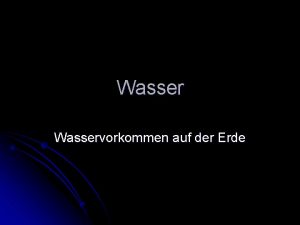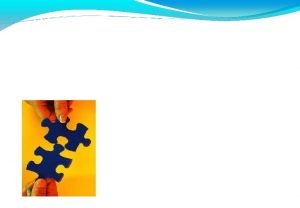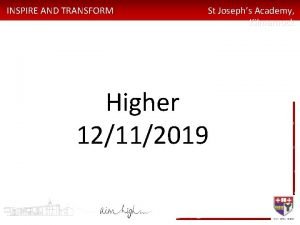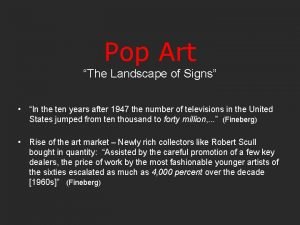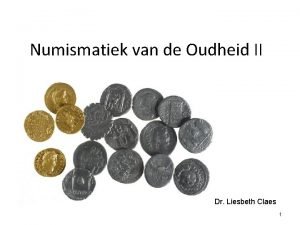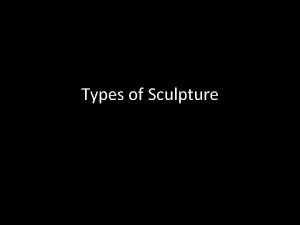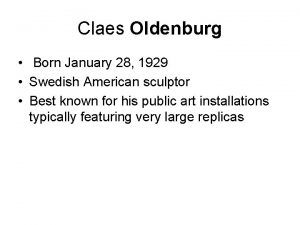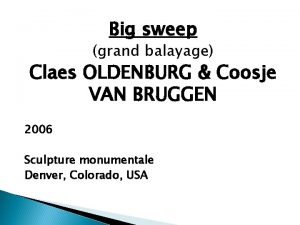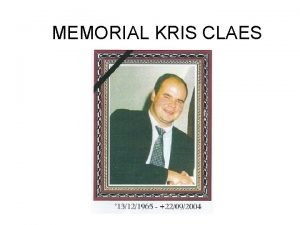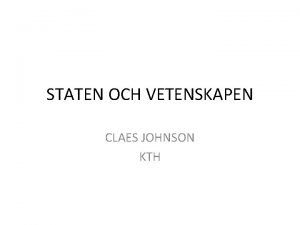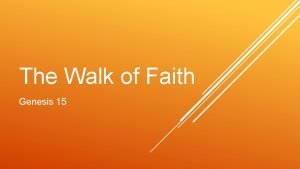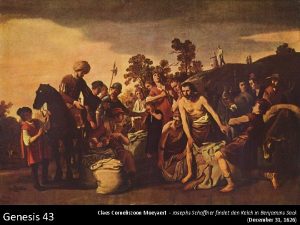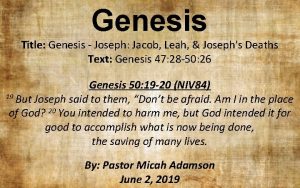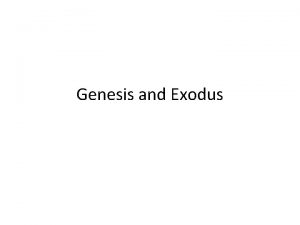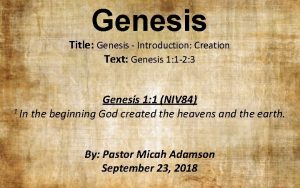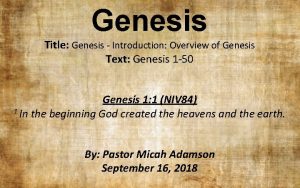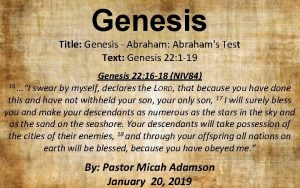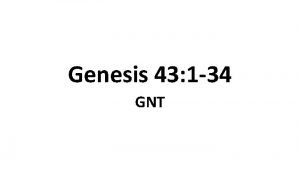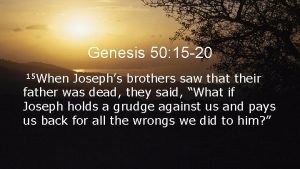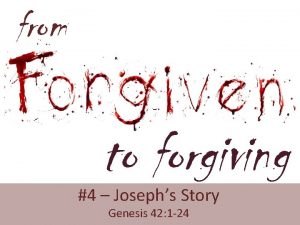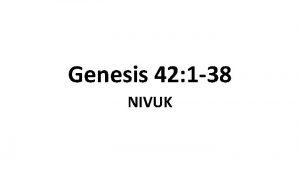Genesis 44 Claes Corneliszoon Moeyaert Josephs Schaffner findet
















![“His [Judah’s] remarkable speech is a point-for-point undoing, morally and psychologically, of the brothers’ “His [Judah’s] remarkable speech is a point-for-point undoing, morally and psychologically, of the brothers’](https://slidetodoc.com/presentation_image_h/1aac6a1b0c7547df05f0bf259fd08ff7/image-17.jpg)



















- Slides: 36

Genesis 44 Claes Corneliszoon Moeyaert - Josephs Schaffner findet den Kelch in Benjamins Sack (December 31, 1626)



Genesis 44: 6 -10 את־הדברים אלהם וידבר וישגם האלה׃ האלה הזה׃ כדברים כדבר מעשות אדני לעבדיך בפי מארץ כסף או מצאנו אליך אדניך אשר השיבנו מבית WBC (v 7 -9) “The brothers protest their innocence in the most outspoken terms. They point to their past behavior: their return of the money on their previous trip. Their wild offer, that if any of them is a thief, he should die and the rest of them be enslaved, shows their confidence in their innocence. But in the total perspective of the Joseph story, the punishment of theft with slavery or death has echoes of their treatment of Joseph; the brothers are now offering to suffer as they made him suffer. So they are being fairer than they realize in making such an offer. ” כנען זהב׃ ומת לעבדים׃ מעבדיך לאדני אתו נהיה אליו ידבר ויאמרו למה חלילה כסף הן אמתחתינו נגנב ואיך ימצא אשר וגם־אנחנו ויאמר כן־הוא כדבריכם גם־עתה




Genesis 44: 11 -15 את־אמתחתו איש ויורדו אמתחתו׃ כלה בנימן׃ ובקטן באמתחת איש החל בגדול הגביע וימהרו ארצה ויפתחו ויחפש וימצא WBC (v 13) “When Joseph disappeared, it was only Jacob who tore his clothes (37: 34); now all the brothers do, the first clear sign of fraternal solidarity. Whereas they had contrived to dispatch Joseph to Egypt, this time they voluntarily return with Benjamin to Egypt. ” שמלתם ויקרעו על־חמרו איש ויעמס ESV Genesis 37: 34 “Then Jacob tore his garments and put sackcloth on his loins and mourned for his son many days. ” העירה׃ וישבו והוא ביתה יוסף ארצה׃ לפניו עשיתם אשר ואחיו ויפלו הזה יהודה שם ויבא עודנו להם יוסף מה־המעשה ויאמר


Genesis 44: 11 -15 את־אמתחתו איש ויורדו אמתחתו׃ כלה בנימן׃ ובקטן באמתחת איש החל בגדול הגביע Contrast verse 14 with the brothers’ previous homage to Jospeh. וימהרו ארצה ויפתחו ויחפש וימצא ESV Genesis 42: 6 “Now Joseph was governor over the land. He was the one who sold to all the people of the land. And Joseph's brothers came and bowed themselves before him with their faces to the ground [ ארצה אפים וישתחוו־לו ]. ” שמלתם ויקרעו על־חמרו איש ויעמס ESV Genesis 43: 26 “When Joseph came home, they brought into the house to him the present that they had with them and bowed down to him to the ground [ וישתחוו־לו העירה׃ וישבו ארצה ]. ” והוא ביתה יוסף ארצה׃ לפניו עשיתם אשר ואחיו ויפלו הזה יהודה שם ויבא עודנו להם יוסף מה־המעשה ויאמר



Genesis 44: 16 -18 Are Judah and his brothers really guilty for stealing the silver cup? Then why does Judah say God has uncovered their guilt? ומה־נצטדק גם Compare: יהודה ויאמר מה־נדבר לאדני מה־נאמר עבדיך מצא את־עו ן האלהים גם־אנחנו לאדני עבדים הננו בידו׃ הגביע אשר־נמצא ESV Genesis 42: 21 -23 Then they said to one another, "In truth we are guilty concerning our brother, in that we saw the distress of his soul, when he begged us and we did not listen. That is why this distress has come upon us. " 22 And Reuben answered them, "Did I not tell you not to sin against the boy? But you did not listen. So now there comes a reckoning for his blood. " 23 They did not know that Joseph understood them, for there was an interpreter between them. הוא בידו הגביע אל־אביכם׃ באזני דבר כמוך כי ויאמר עבדך בעבדך מעשות זאת נמצא לשלום יהודה ידבר־נא אפך לי אשר עבד עלו אליו ויאמר חלילה האיש יהיה־לי ואתם ויגש אדני בי אדני ואל־יחר


Genesis 44: 16 -18 ומה־נצטדק Note how Judah is not going to take up the offer for them all to go free except Benjamin. גם יהודה ויאמר מה־נדבר לאדני מה־נאמר עבדיך מצא את־עו ן האלהים גם־אנחנו לאדני עבדים הננו בידו׃ הגביע אשר־נמצא Joseph presses the test. WBC (v 17) “But Joseph cannot be certain that they are really sorry for their earlier sin, and he puts them in a situation that replicates their situation twenty-two years earlier as closely as possible. He therefore invites them to return home without Benjamin, who will stay in Egypt as his slave. ” הוא בידו הגביע אל־אביכם׃ באזני דבר כמוך כי ויאמר עבדך בעבדך מעשות זאת נמצא לשלום יהודה ידבר־נא אפך לי אשר עבד עלו אליו ויאמר חלילה האיש יהיה־לי ואתם ויגש אדני בי אדני ואל־יחר

![His Judahs remarkable speech is a pointforpoint undoing morally and psychologically of the brothers “His [Judah’s] remarkable speech is a point-for-point undoing, morally and psychologically, of the brothers’](https://slidetodoc.com/presentation_image_h/1aac6a1b0c7547df05f0bf259fd08ff7/image-17.jpg)
“His [Judah’s] remarkable speech is a point-for-point undoing, morally and psychologically, of the brothers’ earlier violation of fraternal and filial bonds. A basic biblical perception about both human relations and relations between God and man is that love is unpredictable, arbitrary, at times perhaps seemingly unjust, and Judah now comes to an acceptance of that fact with all its consequences. His father, he states clearly to Joseph, has singled out Benjamin for a special love, as he singled out Rachel’s other son before. It is a painful reality of favoritism with which Judah, in contrast to the earlier jealousy over Joseph, is here reconciled, out of filial duty and more, out of filial love. His entire speech is motivated by the deepest empathy for his father by a real understanding of what it means for the old man’s very life to be bound up with that of the lad. He can even bring himself to quote sympathetically (verse 27) Jacob’s typically extravagant statement that his wife bore him two sons— as though Leah were not also his wife and the other ten were not also his sons. Twenty-two years earlier, Judah engineered the selling of Joseph into slavery; now he is prepared to offer himself as a slave so that the other son of Rachel can be set free. Twenty-two years earlier, he stood with his brothers and silently watched when the bloodied tunic they had brought to Jacob sent their father into a fit of anguish; now he is willing to do anything in order not to have to see his father suffer that way again. ” Robert Alter on Judah’s speech in Genesis 44: 18 -34 (Art of Biblical Narrative, 174– 75)







Genesis 44: 19 -23 Summary of first visit to Egypt. WBC (V 19 -23) Note no mention of -charge of spying -imprisonment -detention of Simeon. אב היש־לכם וילד WBC (V 19 -23) And Judah slips in more details about the age of Jacob and his attachment to Benjamin. Jacob is “elderly”; Benjamin is “young, ” the “child of his old age”; “his brother is dead” (not just “no more” [42: 13]); and “his father loves him, ” indeed “will die” if he does not return. לאמו לאמר זקן אב לבדו הוא את־עבדיו יש־לנו אל־אדני ויותר מת ואביו אהבו׃ ואשימה אלי הורדהו את־אביו לעזב הנער הקטן אחיכם ירד שאל אל־עבדיך לא־יוכל אל־אדני ומת׃ את־אביו אם־לא אל־עבדיך אדני או־אח׃ ונאמר קטן זקנים ואחיו ותאמר עליו׃ עיני ונאמר ועזב ותאמר אתכם

WBC (V 19 -23) Note no mention of -charge of spying -imprisonment -detention of Simeon. אב היש־לכם וילד לאמו לאמר זקן אב לבדו הוא את־עבדיו ואשימה אלי לעזב אל־אדני ויותר מת ואביו הורדהו הנער שאל יש־לנו אהבו׃ את־אביו Genesis 44: 19 -23 Summary of first visit to Egypt. אל־עבדיך לא־יוכל אל־אדני ומת׃ את־אביו WBC (V 19 -23) The acknowledgment of his father’s favoritism is striking, for it was Jacob’s love of Joseph that caused his brothers to hate him. Now this same favoritism is cited as ground for mercy; the other brothers, or at least Judah, have accepted that love for their father must override all other grudges. הקטן אחיכם ירד אם־לא אל־עבדיך אדני או־אח׃ ונאמר קטן זקנים ואחיו ותאמר עליו׃ עיני ונאמר ועזב ותאמר אתכם




Genesis 44: 24 -29 Summary of the discussion in Canaan. ונגד־לו אבי מעט־אכל׃ אל־עבדך עלינו אדני׃ שברו־לנו שבו לרדת וירדנו ואחינו אתנו האיש ידעתם טרף אתם אך ואמר כי דברי אבינו ויהי את ויאמר ונאמר לא הקטן אחינו אם־יש פני לראות נוכל כי־לא אתנו׃ איננו הקטן אלינו אשתי׃ אבי ילדה־לי מאתי האחד עד־הנה׃ נוכל WBC (V 24 -29) Then he goes on to tell what Jacob surmised happened to Joseph: “Surely he has been torn to bits [cf 37: 33], and I haven’t seen him since. ” “Joseph now hears for the first time what happened at home when the brothers came back without him. עבדך ויאמר שנים כי ויצא He hears of his father’s lament and grief that still persists; he hears the father’s cry ‘torn to pieces, torn to pieces!’ which still echoes in the brothers’ ears” (Westermann 3: 136). ראיתיו ולא






Genesis 44: 30 -34 והנער בנפשו׃ אבי אל־עבדך קשורה ונפשו WBC (V 33 -34) To Joseph, of course, the speech again reveals even more than the speaker intended: the official version of his own death (“torn to pieces”), the reason for the delay in the brothers’ return, the pain his testing as well as his fate must have given. Most important, if to a listener ignorant of the family situation and record, the brothers’ attitude as expressed by their leader would appear admirable, then to one in the know it surely manifests nothing short of a transformation, from subnormal to abnormal solidarity. … אבינו לאמר אבי ומת עבדך הנער מעם את־הנער אליך כל־הימים׃ …That the sons of the hated wife should have come to terms with the father’s attachment to Rachel (“my wife”) and her children is enough to promise an end to hostilities and a fresh start. That the second of these children should enjoy his brothers’ affection is amazing. But that Judah should adduce the father’s favoritism as the ground for self-sacrifice is such an irresistible proof of filial devotion that it breaks down Joseph’s last defences. (Sternberg, Poetics, 308) עבד הנער תחת איננו והנער כבאי אתנו כי־אין כראותו את־שיבת Judah offers himself. עבדיך שאלה׃ עבדך עם־אחיו׃ אל־אבי ערב אביאנו לאבי והיה והורידו ביגון עבדך כי אם־לא וחטאתי ישב־נא יעל והנער אעלה ועתה איננו ועתה לאדני כי־איך אתי

Genesis 44: 24 -29 Summary of the discussion in Canaan. ונגד־לו אבי מעט־אכל׃ אל־עבדך עלינו אדני׃ שברו־לנו שבו לרדת וירדנו ואחינו אתנו האיש כי דברי אבינו אתם את ויאמר נוכל ונאמר לא הקטן אחינו אם־יש פני לראות נוכל כי־לא אתנו׃ איננו הקטן Jan Joosten, Biblical Rhetoric as Illustrated by Judah’s Speech in Genesis 44. 18 -34. JSOT Vol 41. 1 (2016); 15 -30. ידעתם ויהי אלינו אשתי׃ אבי ילדה־לי עבדך ויאמר Judah tells the minister [Joseph]: ‘Our father said to us: “You know that my wife bore me two sons” – he said that to us, ten sons of a different wife, but still we love him and worry about him. That is the way one should behave toward one’s family. ’ By telling the story, Judah draws the minister into the family circle. It is almost as if Judah wishes to suggest to the minister that he too is a member of the family. By introducing a ‘third party’, Judah tries to develop a personal relationship with a stranger. The strategy is not based on logic. But we can fill its strength. טרף אך ואמר מאתי שנים האחד עד־הנה׃ כי ויצא ראיתיו ולא
 Badewannenfüllung liter
Badewannenfüllung liter Gescheiter mensch
Gescheiter mensch Erwin moeyaert
Erwin moeyaert Christian schaffner
Christian schaffner Greg senko
Greg senko Schaffner esd simulator nsg 435
Schaffner esd simulator nsg 435 St josephs suicide
St josephs suicide St joseph's academy kilmarnock
St joseph's academy kilmarnock Schwerpunktcurriculum marburg
Schwerpunktcurriculum marburg Anderton st josephs
Anderton st josephs St josephs foxford
St josephs foxford John rasputin
John rasputin Rawmarsh st josephs
Rawmarsh st josephs Pastry case claes oldenburg
Pastry case claes oldenburg Claes feinbaum
Claes feinbaum Claes bengtsson
Claes bengtsson Is claes oldenburg still alive
Is claes oldenburg still alive Quandrans
Quandrans Daniel claes
Daniel claes In advance of the broken arm
In advance of the broken arm Claes oldenburg facts
Claes oldenburg facts John spesak
John spesak Claes oldenburg big sweep
Claes oldenburg big sweep Keith ferry norwich canaries
Keith ferry norwich canaries Claes oldenburg
Claes oldenburg Chalmers cas
Chalmers cas Claes mangelus
Claes mangelus Claes johnson
Claes johnson Claes oldenburg ice cream
Claes oldenburg ice cream Ruth claes
Ruth claes Claes martinsson
Claes martinsson Pieter claes
Pieter claes Claes feinbaum
Claes feinbaum Genesis 2 27-28
Genesis 2 27-28 Lessons from genesis 7
Lessons from genesis 7 Genesis does
Genesis does Genesis 15 9
Genesis 15 9
